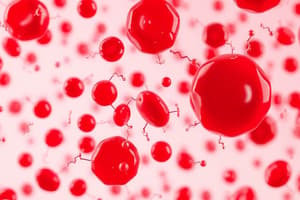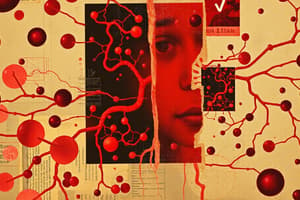Podcast
Questions and Answers
What is hematology?
What is hematology?
The study of blood in health and disease, mainly concerned with the formed elements in the blood.
Which of the following are components of blood?
Which of the following are components of blood?
- Erythrocytes
- Leukocytes
- Thrombocytes
- All of the above (correct)
What are the functions of blood?
What are the functions of blood?
Transportation, regulation, and protection.
What is hemopoiesis?
What is hemopoiesis?
All formed elements in the blood are derived from stem cells in the liver.
All formed elements in the blood are derived from stem cells in the liver.
What is the primary role of plasma proteins?
What is the primary role of plasma proteins?
Which statement about plasma and serum is true?
Which statement about plasma and serum is true?
What are the two main cell lines derived from stem cells?
What are the two main cell lines derived from stem cells?
Blood volume in males is approximately ______ liters.
Blood volume in males is approximately ______ liters.
There are antivenoms that treat bites from a specific type of snake called ______ antivenoms.
There are antivenoms that treat bites from a specific type of snake called ______ antivenoms.
Flashcards are hidden until you start studying
Study Notes
Functions of Blood
- Transportation of O2, CO2, nutrients (glucose, calcium), hormones, and waste products.
- Regulation of body temperature, pH, and overall homeostasis.
- Protection through hemostasis (clotting) and immunity (antibodies).
Components of Blood
- Blood comprises formed elements (cells and fragments) and plasma (liquid matrix).
- Formed elements include leukocytes (white blood cells), erythrocytes (red blood cells), and thrombocytes (platelets).
- Plasma consists of water, proteins, and other solutes; key for transporting substances.
Hematology Overview
- Study of blood components in health and disease.
- Formed elements arise from stem cells in bone marrow.
- Examines issues related to RBCs, WBCs, platelets, blood vessels, and proteins involved in bleeding and clotting.
Hematopoiesis
- Hemopoiesis encompasses erythropoiesis (red cells), leukopoiesis (white cells), and thrombopoiesis (platelets).
- Hematopoietic locations include organs and tissues, with red bone marrow producing blood cells.
- Distinction between red marrow (active) and yellow marrow (fatty).
Blood Cell Development
- Multipotent stem cells can differentiate into various cell types, leading to progenitor/committed stem cells, blasts, and mature cells.
- Two main cell lines: myeloid (produces RBCs, platelets, granulocytes) and lymphoid (produces lymphocytes).
Salaries in Hematology/Oncology
- Median income for hematologists/oncologists is $481,250.
- Salary range varies from 328,540to328,540 to 328,540to810,850 based on experience and location.
Clinical Uses of Blood Components
- Plasma is used for patients recovering from blood loss during surgeries or severe injuries.
- Serum is employed in diagnostics, research, and immunotherapy (e.g., vaccination).
- Antivenoms produced from animal serum counteract specific venoms through neutralization.
Blood Composition and Volume
- Blood volume averages 5-6 liters in males and 4-5 liters in females.
- Blood consists primarily of plasma (approximately 55%) and formed elements (approximately 45%).
Distinction Between Plasma and Serum
- Plasma is the liquid component of blood; serum is plasma without clotting factors.
- Understanding the difference is crucial in clinical settings for blood treatment and analysis.
Key Plasma Constituents
- Water (92%): Serves as a solvent and heat absorber.
- Proteins (7%): Produced mostly by the liver; regulate colloid osmotic pressure, pH, and transport hormones and fatty acids.
Major Plasma Proteins
- Albumins: Smallest plasma proteins with crucial roles in maintaining osmotic pressure and transporting various molecules.
Studying That Suits You
Use AI to generate personalized quizzes and flashcards to suit your learning preferences.




